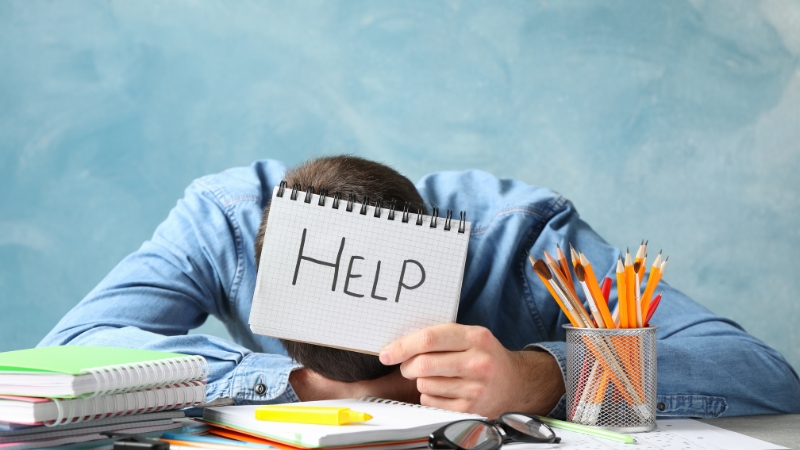There’s tired, and then there’s burnout.
One is the kind of exhaustion that hits after a long day — maybe you crash on the couch, watch something dumb on Netflix, and wake up feeling mostly fine. The other sticks with you.
You can sleep all weekend and still feel like your bones are made of cement. You used to care about your job, your to-do list, even the people around you. Now, it’s just…meh.
That’s burnout.
And no, it’s not in your head. It’s not about being “too sensitive” or just needing to toughen up. It’s what happens when your stress levels have been in the red zone for too long. It can hit anyone — parents, teachers, doctors, coders, students, freelancers, fast-food workers, you name it.
Let’s talk about what burnout really looks like, what causes it, how it’s different from depression, and — importantly — what you can do about it.
What’s Going On?
Burnout isn’t just feeling overwhelmed — it’s the body and brain saying, “I’m out.” It’s emotional, physical, and mental exhaustion that builds up over time when the pressure doesn’t let up.
A few classic signs?
It’s not just a rough week. Burnout sticks around. It seeps into every part of your day, even the stuff you used to enjoy.
Stress vs. Burnout vs. Depression

People throw these words around like they’re interchangeable, but they’re not.
Stress is usually temporary. You’re swamped with tasks or racing to meet a deadline, but once it’s done, the tension eases up. Stress revs you up.
Burnout, on the other hand, drains you. It’s like running on fumes — for weeks, sometimes months. There’s no gas in the tank, and your check engine light’s been flashing for a while.
Depression goes deeper. It doesn’t just affect your work or one role — it affects everything. Sleep, appetite, mood, energy, thoughts. You might feel hopeless, worthless, or emotionally flatlined, even without a clear reason.
Burnout can slide into depression if it goes unaddressed long enough. But there’s a key difference: burnout often improves with rest and changes in workload. Depression usually doesn’t.
Still unsure? You’re not alone. If you’re even asking the question, it’s worth checking out a free mental health screen.
For Neurodivergent People, It Hits Differently
If you’re autistic, have ADHD, OCD, or a learning disability, you’re probably no stranger to burnout, but it might show up differently.
You’re managing more than just job tasks or social expectations. There’s masking, sensory overload, and constant adaptation to environments not designed for you. It’s exhausting. And if you’re not getting the accommodations you need, the stress piles up fast.
Some common burnout triggers for neurodivergent folks:
Recovery might take longer and need a different approach — one that’s built around your unique needs, not someone else’s idea of “normal.”
What Actually Helps? Real Talk on Recovery

First, Call It What It Is
Let’s not sugarcoat it — you’re burned out. That doesn’t make you weak, broken, or bad at what you do. It means your brain and body have been running on empty for too long.
You don’t just need a nap. You need a reset.
And honestly? You’ve probably been pushing through a lot. Work stuff. Family stuff. Life is just being a lot. Making it this far is no small win. Give yourself credit for surviving days you didn’t think you could.
Boundaries: Start Small and Stay Consistent
You don’t need a grand gesture like quitting your job or tossing your phone in a river. Boundaries don’t have to be huge to make a difference.
Start with the simple stuff:
These tiny choices send a powerful message to your nervous system: you’re allowed to slow down.
You Don’t Need a Getaway to Rest

Taking a week off in the mountains sounds great. But if that’s not in the cards, don’t wait for perfect circumstances to recharge.
Find your rest where you can:
Even short pauses can help regulate your nervous system. You don’t need a full day — sometimes 60 seconds will do.
Habits That Build a Bit of Burnout Armor
There’s no such thing as burnout-proof living, but some routines can make you a little more resilient — especially when stress keeps creeping in.
Try things like:
It might feel awkward or forced at first. That’s okay. The key is experimenting — seeing what actually feels good, what doesn’t, and adjusting as you go.
Ask for Help — And Actually Accept It
Here’s where things often get tricky. A lot of people hit a wall here, not because they don’t want support, but because asking for it feels uncomfortable. There’s that inner voice saying you should be able to handle everything, keep all the plates spinning, push through.
But the truth? Doing it all alone isn’t strength — it’s survival mode. And survival mode always has an expiration date.
View this post on Instagram
If you’re at your limit, talking to a therapist or counselor can make a huge difference. If your job offers an Employee Assistance Program (EAP), it’s a great place to start. It’s confidential and usually free.
You can also start smaller — maybe it’s asking your partner or roommate to take something off your plate, like dinner or school pick-up. Or just texting a friend to say, “Hey, I’m tapped out. Can we talk for a bit?” That simple act of letting someone in can be a lifeline.
Support doesn’t have to come in the form of big solutions. Even 15 minutes where you don’t have to be “on” — no emails, no caregiving, no work — can create just enough space for you to breathe. And if you’re caregiving or parenting on top of everything else? It’s a whole different level.
If You’re Parenting or Caregiving, It’s Extra Real
Parenting or looking after someone who depends on you every day is its own full-time job, and when you’re also juggling work, relationships, and daily life, burnout creeps in fast. The catch is that stepping away isn’t always an option, so the challenge becomes finding moments of relief without completely rearranging your life.
If you’ve got a neighbor, relative, or friend nearby, asking for even 30 minutes of coverage can be a game-changer. You might also be able to trade time with another parent — you take their kid for an hour today, and they return the favor over the weekend. It doesn’t have to be complicated. The key is to stop expecting yourself to be on 24/7 without a break.
And here’s something people don’t say enough: it’s okay to skip the laundry. It’s okay to order pizza. It’s okay to lower the bar for a day or several. There’s no medal waiting for you if you burn yourself out trying to keep everything perfect. Let someone help. Or at least, let yourself off the hook.
Self-Care: Small and Strategic
“Sometimes, self care is about knowing when to cancel plans…”#socialwork #selfcare #burnouthttps://t.co/8iM8sk60NK
— Social Work World (@socialworkO) May 20, 2025
Let’s be honest — a lot of self-care talk out there feels completely unrealistic. You don’t need a weekend retreat or a 10-step morning routine to start feeling a little more like yourself. Real self-care starts with the basics, especially when you’re running on fumes.
Think small: drinking water before your next meeting, stretching for thirty seconds when you get out of bed, and unclenching your jaw during a traffic light. These tiny moments are often enough to shift you out of autopilot, even briefly. You might not feel like they’re making a dent, but over time, they do.
If you’ve got a bit more energy, go for something slightly more engaging. Take a walk without your phone — no step goals, no productivity angle, just movement. Watch something that actually makes you laugh.
Or grab a book and read a few pages instead of scrolling through your feed. And if nothing feels appealing or “worth it,” that’s okay too. You don’t need to feel good to begin caring for yourself — you just need to start. One small thing. That’s enough.
When You’re Ready, Step Back and Rethink the Load
Eventually, when you’ve caught your breath — even just a little — you’ll have space to take a wider look at what’s been burning you out in the first place. That’s the moment to ask some honest questions.
What’s truly draining you? What could you pause, hand off, or stop doing altogether? What’s one adjustment you could make that would make tomorrow feel a little easier?
Sometimes it’s practical stuff — shifting responsibilities at work, getting help at home, building in regular breaks. Other times, the change that needs to happen is deeper: your job might be unsustainable, your schedule might be all wrong for your energy, or your expectations of yourself might be way too high.
That doesn’t mean something’s wrong with you — it means you’re living in a way that isn’t working, and it’s time to tweak the system.
You don’t need a total life overhaul. Start small. One change at a time. Every bit of pressure you take off counts. And the more breathing room you create, the easier it gets to keep moving forward, without burning out again.
Quick Recap
Here’s the short version, in case your brain’s too fried for long reads right now (we’ve all been there):
Burnout doesn’t mean you’re broken. It means the system you’re in — whether that’s your job, your home, or your culture — is asking more from you than you can give long-term. It’s okay to step back. It’s okay to want less. It’s okay to say no. Your well-being is not a reward for grinding yourself into the ground. It’s right. And the more you protect it, the better you’ll be at everything else you care about.
What’s Happening
What Might Help
You feel fried and empty.
Name it: burnout. Not failure.
You dread things you used to enjoy.
Take breaks. Even tiny ones.
You’re snapping or zoning out.
Set small boundaries. No Slack after dinner.
Your body’s freaking out.
Water, stretch, deep breath. Repeat.
You feel alone in it.
Reach out — even if it’s just one person.
You’re stuck.
Change one small thing. Just one.
Final Thoughts
